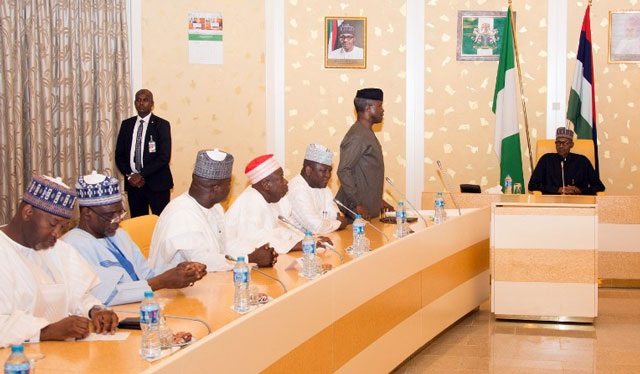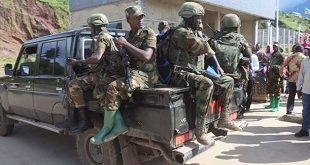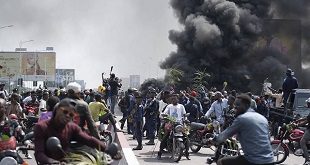
President Buhari arrived back in Nigeria on Friday after nearly two months in London receiving treatment for an undisclosed ailment. AFP PHOTO
Abuja, Nigeria | AFP |
President Muhammadu Buhari on Friday returned to Nigeria after nearly two months’ medical leave in Britain but did little to quell fears about the state of his health by saying he would not start work again immediately.
The 74-year-old, who has been in London since mid-January, said that although he felt better, he still required rest and further treatment in the coming weeks.
Vice-President Yemi Osinbajo would remain in charge at least over the weekend, he added.
Buhari, who looked gaunt in a billowing black kaftan, did not specify when he would resume his duties but his spokesman, Femi Adesina, said his return would be formalised on Monday.
He will write a letter to the National Assembly on Monday, Adesina said in a tweet, adding: “That makes his return to work formal, and constitutional.”
Buhari’s unspecified illness has been an increasing source of speculation in Nigeria ever since he left for London on January 19 for medical tests during a period of annual leave.
Aides had to counter persistent rumours online that he was seriously ill or even dead, despite a series of photographs showing him meeting senior Nigerian politicians.
On Thursday he was shown in photographs looking painfully thin at a meeting with the most senior cleric in the Anglican congregation, Archbishop of Canterbury Justin Welby.
His office has maintained throughout his absence that Buhari was “hale and hearty”.
But Buhari appeared to contradict that in a rambling address to ministers and senior members of his ruling All Progressives Congress party that touched on the importance of education and technological advances, and appeared to warn against the dangers of self-medicating.
He made no mention of what illness he was suffering from but said had thought he had received “the best of treatment I could receive”.
“I couldn’t recall being so sick since I was a young man,” he added, referring to “blood transfusions, going to the laboratories and so on and so forth”.
He was “pleased to be back”, although he disclosed that he may need “further follow-up within some weeks”, without elaborating.
Buhari’s return from London was announced on Thursday evening and he said he “came back towards the weekend, so that the vice president will continue and I will continue to rest”.
The presidency maintained the comment was light-hearted but was quickly followed by his spokesman’s tweet clarifying the constitutional position.
– Persistent rumours –
Buhari has been dogged by rumours about his health even before he came to power in May 2015 after a landmark election win against president Goodluck Jonathan two months previously.
Jonathan’s Peoples Democratic Party claimed Buhari was critically ill from prostate cancer. He dismissed the assertion as an unfounded smear designed to show him as unfit for high office.
The PDP repeated its claim about Buhari’s health in May last year after he appeared frail at a security summit and cancelled a series of engagements.
Buhari then travelled to London the following month to receive treatment for what was described as a persistent inner ear infection.
He left for London again in January but on the eve of his expected return on February 5, his office announced he had to extend his stay to receive medical test results.
The health of Nigeria’s president has become a sensitive issue following the 2010 death of president Umaru Musa Yar’Adua from a long-standing, but previously undisclosed, kidney complaint.
Yar’Adua’s initial illness and treatment in hospital abroad triggered months of political uncertainty. His deputy, Goodluck Jonathan, took over on Yar’Adua’s death.
Buhari’s office has been keen to avoid the impression of a political vacuum and Osinbajo, a 60-year-old lawyer and church pastor from the southwest, has been a visible presence.
His consensual, energetic style has contrasted with that of Buhari, who has been criticised for his personal but slow style of governance with a close-knit, tight-lipped inner circle.
Nigeria fixes presidential elections for February 2019
Nigeria’s next presidential and parliamentary elections will be held in February 2019, the Independent National Electoral Commission (INEC) has announced.
INEC said on Thursday the early release of the election timetable was “to allow for proper planning by the commission, political parties, security agencies, candidates and all stakeholders”.
Presidential and national assembly elections will be held on Saturday, February 16, 2019, while regional and local elections to elect new governors and local assembly members will be held two weeks later on Saturday, March 2, 2019.
Nigeria’s constitution stipulates that elections must be held in the closing months of the president’s term, within a period not earlier than 150 days and not later than 30 days before it officially ends.
The last elections in March 2015 saw Muhammadu Buhari of the All Progressives Congress defeat sitting president Goodluck Jonathan of the Peoples Democratic Party.
It was the first time in Nigerian political history that an opposition candidate had won at the ballot box against an incumbent head of state.
Buhari took office on May 29, 2015.
The vote was initially postponed from February 14, 2015 as the government said the military could not provide security at polling stations because of operations against Boko Haram insurgents.
The election passed off broadly without a hitch, despite a history of widespread voter fraud and election-linked violence that left hundreds dead across the country in previous polls.
 The Independent Uganda: You get the Truth we Pay the Price
The Independent Uganda: You get the Truth we Pay the Price


